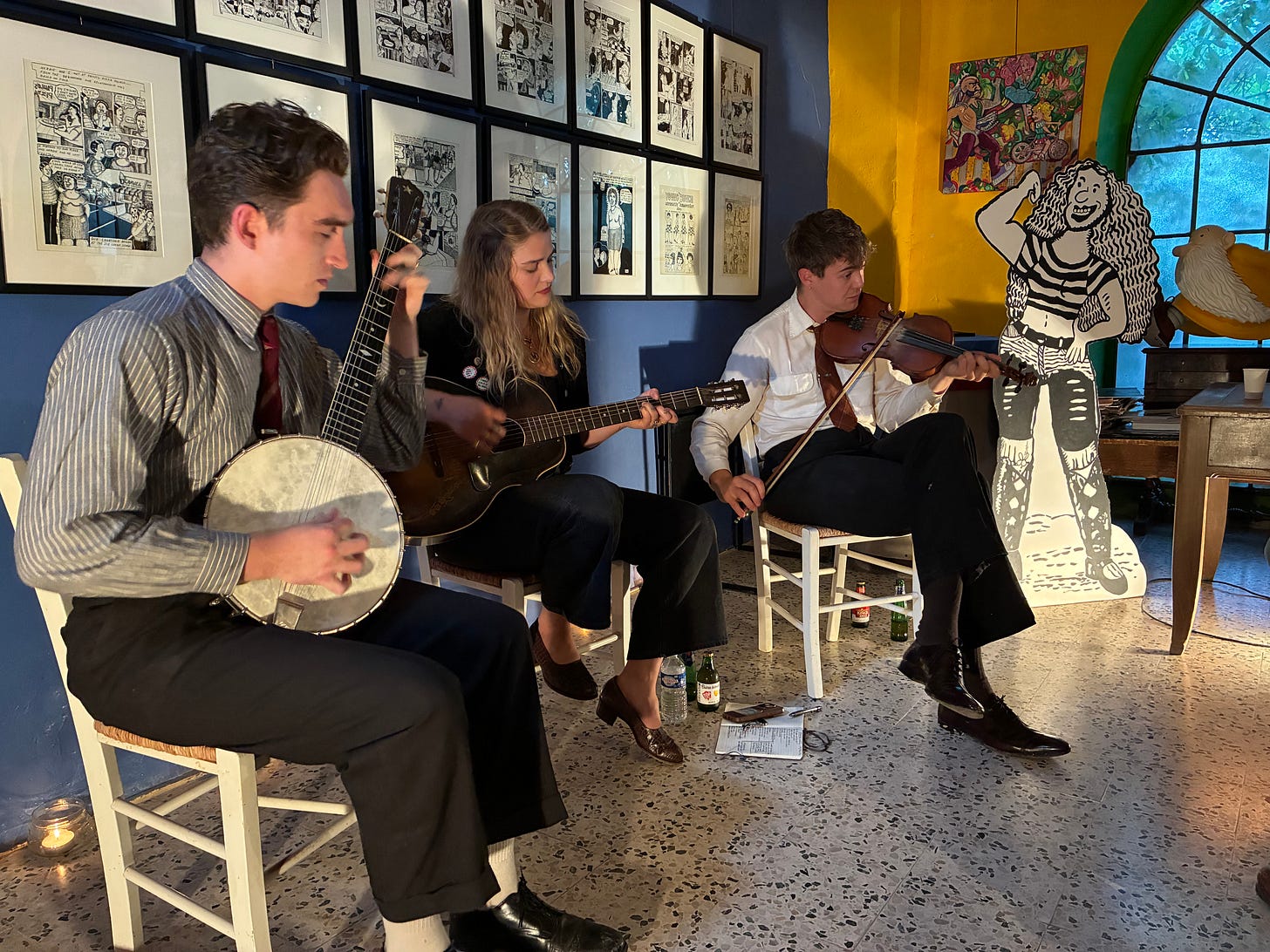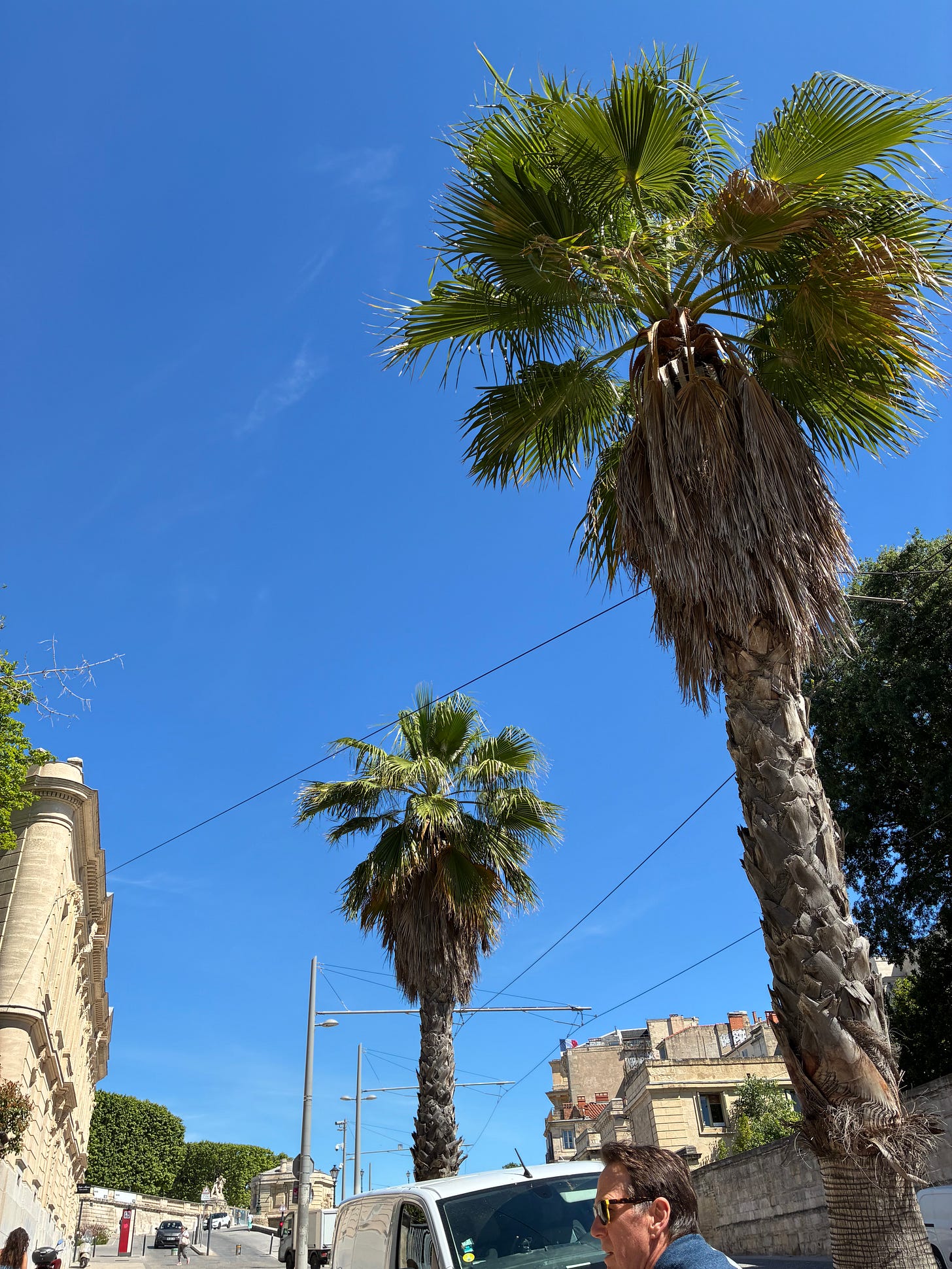Natural disasters of the interior landscape
A new tumor qualifies me for trials, we contemplate a move, and muse on the power hierarchies of space and time. Also, Nepantla as homeland.
As is so often the case, this was not the post I intended to write.
This week I had a CT scan followed by an appointment with my oncologist in Montpellier. Dr. D’s first words to me were, “You should get in touch with Dr. Leary to see what trials she might have for you, because you now have a tumor of 1.7 centimeters, big enough to qualify you.”
Yay! “Measurable disease.” I put that in quotes because of course it was measurable before I developed the new tumor—otherwise we wouldn’t know that I have it, crop dusting my abdomen. There are the tumor markers rising dramatically, the thickened peritoneum, the malfunction of my bowels. But only big tumors count when it comes to trials. Big being relative. Only big tumors are “measurable.”
Okay, so that “Yay!” above is not what I was feeling when she told me. Or rather, only a small part of what I was feeling. I spend a lot of time in her office trying not to feel anything about what she is telling me. Because what she is telling me over and over and over is that I am going to die and it won’t be long and there is no hope. I keep asking for hope, and she won’t give it. There is no chance of you ever being without cancer, she said. None. “I know you want me to give you hope but—”
“But we just don’t know,” said Tim quickly.
“That’s right,” Dr. D said with some relief. “We just don’t know.”
Also, she’s not sure I can make it to August, when a trial she thinks might help me starts, without needing other intervention. “If you were to stop taking Movicol and Avastin today, in three weeks you would not be able to eat,” she said. If that happened, I would have to probably do some kind of chemo, but chemo would disqualify me from any trials. So right now I am focused on trying very hard to keep my bowels moving until I can get to a trial.
As I write this, I feel nothing (except to think—Twenty weeks of nonstop chemo! Three years of nearly nonstop chemo and surgery, only to land here). Writing this allows me to hold these facts away from my heart, to push them instead onto the page.
I have already written to my oncologist in Paris to ask her if she has any trials that might help me that start before August. I don’t want to wait. Waiting is terrifying. The universe apparently thinks I have more to learn about dwelling in liminal spaces. And I surely do. But.
In other liminal news, Theo and Tim and I spent all last weekend debating whether or not to move to London. A friend offered us his flat at below-market rent and it looks amazing. But all of us are conflicted, even Theo. While she is desperate to go to a British school, she fears switching school systems for her final two years. She at least understands the system she is in, knows how to work within it. At the same time, she craves a happy school experience. There are no guarantees, I know, she said. But…. She also wants to be able to write and perform in English. And she loves London. We’ve investigated the school she would likely attend in London, which looks exciting. She might have a better chance of paying lower university fees in England if she finishes school there. (This is complicated. You do not want me to explain the labyrinthine British university fee systems).
I also love London, though my relationship with the city is complex. I crave the stimulation of city life. I want to be surrounded by ambitious, working people. Theatres. Museums. Parks. Gatherings of friends. Readings. Book launches. Talks at the British Museum. At the same time, I fear leaving French healthcare. While I had a good experience with cancer care on the NHS, recent news reports found that cancer patients in the UK are facing long delays in getting lifesaving drugs, largely because of FUCKING BREXIT. It’s also slowing research.
From the Independent: A new report “found instances where the cost of importing new cancer drugs had nearly quadrupled due to post-Brexit red tape, while some trials have seen shipping costs jump 10 times since Britain pulled out of the EU. Extra rules and costs are having a “significant negative impact” on cancer research in the UK and creating “new barriers” that are “holding back life-saving research” for Britons, the report found.”
https://www.independent.co.uk/news/uk/politics/brexit-nhs-cancer-starmer-labour-b2736412.html
So that is probably my greatest fear about moving to London. But the greatest challenge of the move would be the expense. Tim says he would have to go back to work in order for us to survive there. We can’t manage on his pension. And god knows I haven’t been a terrific financial provider lately, despite my best efforts. While Tim says he wants to move wherever will make me and Theo happy, it’s clear that he would be stressed out of his mind if we moved to London. He is 67 years old. He has worked every day of his life. He is entitled to his retirement. How could I take that from him?
Every time we talk, we come to no conclusions. Every time I think we are on the verge of committing to a decision, we sway the other way. And now…. With this recent news, I don’t know how I can move in the middle of this. Unless there are trials in London for which I qualify.

https://www.wweek.com/music/2023/07/04/how-portland-old-time-trio-stone-sues-forty-drop-few-came-to-collaborate-with-r-crumb/
I want to offer you more than my own narrative. Always. I promised you stories from the EACWP conference in Paris and you shall have them. In the interest of pith, this week I offer just a few thoughts on hierarchies of space and time. There is more to come!
Once of the last workshops I attended was led by Swedish writer Martin Martin Cathcart Frödén, who lives in Glasgow. He led us in exercises designed to make us notice the hierarchies implicit in space and time. Architecture creates power hierarchies. For example, prisons are designed to show the prisoners that the state has power over them. It can control where they move. They can walk this way but not that way. See this and not that.
Power hierarchies are apparent in civic, private, and commercial spaces. Who can walk through a dark archway at night? Why can a white man walk through a dark archway at night and others (perhaps women) cannot?
There are always red lights, gates, doors, places we are not allowed to go. Who owns the streets? Who is allowed to own them? Your access to the world is different when you are navigating it with a pram, a wheelchair, or a broken foot.
Martin asked us to first write detailed directions about how to get from our childhood bedrooms to our first school. We were then to take those directions, and follow them around Paris. Layering our past over our present. Afterwards, we wrote about the experience of overlaying the two maps and how it affected our perception of our surroundings. And what we noted about where we were allowed to go and what was barred from us.
On my walk, I noticed everything was gated. The vast psychiatric hospital, the blocks of flats, the courtyards of unnamed buildings. A massive truck was parked on the sidewalk, a space I thought pedestrians owned. I passed a garden where fenced flowers grew out of reach. A high red metal mesh surrounded a crèche, the children locked safely inside. Whole blocks were behind bars.
Nothing was barred from me in childhood except my parents’ bedroom door on Saturday mornings. No gates and no security guards at my school. No fences around the monuments to war dead. No restricted access to the graveyard, surrounded by a low stone wall. Not even my parents were barriers. We wandered freely and alone around the village. I can’t remember walking the streets with one of my parents. I could cross greens and streets and wander the woods. Even walk through neighbors’ yards—except we needed permission from Michael’s mother to use his pool.
Later in Paris, I listened to Mexican-American author and professor Daniel Chacón discuss nepantla, the nahuatl word meaning inbetween. The land between lands. (My homeland). He lives and works on the border between Mexico and the US. He discussed dualities, the need for him to negotiate both the materialistic systems of the US and the spiritual systems of Mexico. “Mexicans are very in touch with the dead on a daily basis,” he said. “We live in Nepantla every day. I see dead walking down the street. I am always called by the dead.”
This excited me. I want to be a visible dead person once I go! I want people to see me walking the streets forever. But will only Mexicans be able to see me? Only the Mexican friends who know me, of course. Or does it only work if I am Mexican too?
Reality, said Daniel, is not just the material world.
Who controls these liminal spaces? I wonder. Does anyone? Or are liminal spaces democratic by nature? Discuss.
“These edges, boundaries and borders are dynamic places of transformation. While they are unstable, unpredictable and precarious, they are also places of greater diversity and therefore greater potential for creativity, innovation and productivity. These liminal spaces provide ‘dynamic spaces for transformation, community and social action.’ Or as the beloved Chicana author and cultural pioneer, Gloria Anzaldua puts it, ‘nepantleras facilitate passages between two worlds.’”
— Elena Huegel from “Where Heaven Caresses Earth” in Neither Here nor There: The Many Voices of Liminality
And so I take this space in which I am living and churn it into fertile ground for creativity. This is what I am doing here. For as long as I am able, this will be my task.
(I had already finished this post and written the headline when I paused to do yoga. And the very first thing that my online yoga teacher says is “pay attention to your internal landscape.” No lie. Then she said, “feel a fine dust settling inside of you.” It was bizarre, like she had been peering over my shoulder as I wrote).
I’m leaving comments open this week, as I would love to hear from you.







I feel redundant saying you’re a beautiful writer, but I’m always stunned by how you manage language in a time not only of liminality but fear and uncertainty.
The moving dilemma is a tough one, but if I break it down objectively, as an outsider, I don’t see a lot of pros for moving to London. There are so many unknowns now for you all—it’s hard to imagine trading what little is solid beneath your feet for so much that would be new and unpredictable — from Tim’s work life to Theo’s schooling to (most importantly) your healthcare. London sounds like pressure and change and a potential threat to your medical future. Would it be worth it?
I love you and am thinking of you all the time. I wish I could help in some way. Thank you for gracing us with these updates.
Thank you for sharing so honestly. I’m grateful to hear your voice. I’m sending love to you and your whole family.